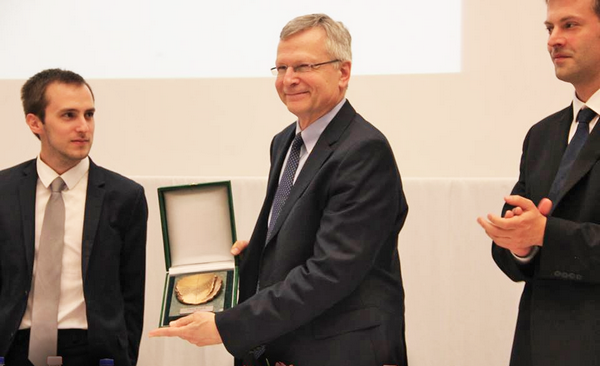Populism from the right and from the left – where is the world heading? This year Dani Rodrik received the John von Neumann award conferred by the Rajk László College for Advanced Studies

At the invitation of the Rajk László College for Advanced Studies of the Corvinus University of Budapest, Dani Rodrik professor of the Harvard University gave a talk on 16 May 2018 on the occasion of receiving the John von Neumann Award granted by the students of the college.
The professor started by saying that long-standing globalization trends have suffered a political backlash in the past years and this phenomenon has apparently led to concerns among economists. Rodrik said that twenty years ago he had already drawn attention to the fact that globalization was not necessarily sustainable politically as serious social tensions were slumbering beneath the surface.
Why has the phenomenon of emerging globalization triggered populist reactions?
In his structured response the professor noted that within the fabric of society a serious economic gap opened up which raises issues of fairness, fundamental values, the proper representation of certain groups. Although globalization in economic terms has increased the size of the whole cake, i.e. the wealth that created and shared among the various groups of society, the problem is not only that certain groups received a much bigger slice, it is also that large sections of society get a much smaller slice than before. Globalization has turned out to be increasingly redistributive and therefore subject to political challenge. Moreover, employers have gained greater dominance over employees. In fact, whereas most of the barriers limiting the free movement of capital have ceased, the free movement of labour is still restricted both legally and in practical terms. As a result, groups of workers with less bargaining power have been predominantly exposed to the effects of economic shocks. Concerns about the fairness of competition have over time led to market competition losing largely its social legitimation: due to deficiencies in regulation, not every actor competes under the same rules, thereby questioning the outcome of competition.
What is the nature of social issues, who are we to blame?
This question is in the centre of populist counterattacks against globalization. In search of an answer, different narratives have emerged. The so-called left-wing populist answer is that banks, multinational companies, the International Monetary Fund, and generally the rich are responsible for social inequalities and the corruption of common values. Right wing populists, on the other hand, hold the minorities and foreigners accountable for our worsening fortunes. The professor pointed out that these were not random answers stemming from the indignation of certain politicians, but were historically embedded narratives that are present with different undertones in each country. The good, the bad and the ugly: these are the possible future scenarios according to Dani Rodrik. The „good” scenario involves democratic readjustments of societies in the years to come, tends towards reducing inequalities and stronger national self-determination. The „bad” scenario predicts global collapse similar to the one experienced in the 1930s as a result of decline in economic co-operation. Finally, the „ugly” scenario suggests that underlying tensions will undermine the institutional system of liberal democracy. In the light of the above, the professor’s interpretation of the numerous developments of the next few years will be worth following in order to seize the opportunities that might take us in the right direction.
Miklós Kozma
Department of Business Studies
